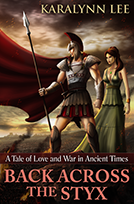notes on Back Across the Styx

Jericho "Serathus" Benavente
The Battle of Plataea was a genuine historical conflict, and is generally credited for definitively repelling the Persian land incursion. It doesn't carry half the glory as Thermopylae (depicted in the film 300 as the Spartans' last stand), and I suspect part of this is due to confusing logistics. The historian Herodotus describes maneuvers like night-time retreats and sacrificing animals before engaging in battle, and I did my best to depict those without making them seem quite as crazy as they sounded to me.
Several characters in the story actually existed during this time. Aristodemes was indeed shamed for missing out on the first battle, and grudgingly given credit for dying in the second; he was noted for a particularly crazy charge in his eagerness to redeem himself. The manticore — a creature of Persian myth — gave him a good reason for it. I didn't like him at first (kidnapping my heroine!) but came around about the same time Myrinne did. Greek mythology actually contains multiple examples of trying to retrieve people from the underworld, which gave me the basis for his drugging Cerberus and restoring the dead with blood. (For a while, the working title was "the Ancient Greek zombie story.")
The Greco-Persian Wars originally didn't figure into this story at all. The seedling idea was the opening scene, with the birth on the ferry and Charon's adoption of the infant. I intended to write a coming-of-age tale for Myrinne, who would head off to solo adventures in the sunlit lands and return to relieve her father of his duties. I figured, why else would Charon want a baby but to have an heir? But it was far more fun to entangle her in a romance (and the romantic interest came with his own set of plot points, of course). I did still think it was impoportant to show not only Myrinne's love for Charon, but also his for her.
Bion is entirely of my own making, since I needed another child in the underworld to provide Myrinne some company. Although in the Greek myths I've read, Hades and Persephone never had children, I was fascinated how Hades never was known to cheat on her (unlike most of the philandering gods), so perhaps there was something worthwhile in a man who otherwise won his wife by abducting her. There are lots of stories about this couple and their bitter beginnings together, and I wanted them to find peace somehow; the epilogue was actually written long before the actual ending of Myrinne and Bion's tale. Writing Bion struck me rather like portraying him as a child of modern divorce, and it felt natural for him to be overprotected and a bit reckless because of it, yet fiercely determined not to overstep his bounds with a woman.
I do have some notion of writing more stories using other cultures' myths as backdrops. I started with Ancient Greek since apparently I know them well enough to rock this category in pub trivia.
